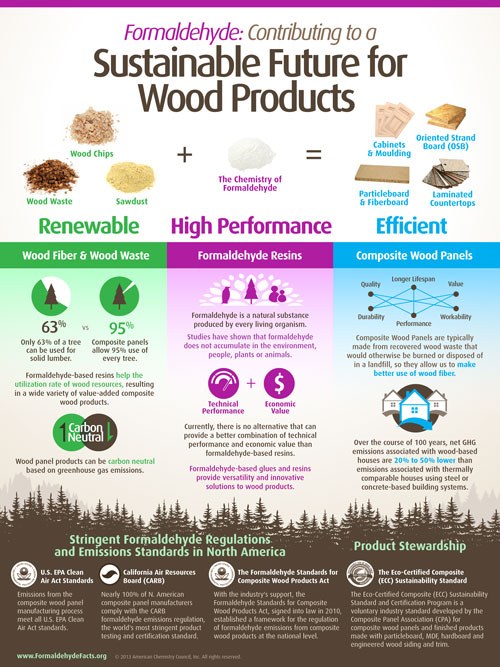Formaldehyde Is Functional, Efficient and Affordable
The ability of formaldehyde, in combination with countless other molecules, to chemically react and subsequently build resilient structures makes it one of the most functionally important chemical building blocks in the manufacturing world today. Formaldehyde provides exceptionally high functionality in a resource-efficient way. This means it is affordable -- no other organic molecule is able to achieve the same results at the same cost. Resource-efficiency also means materials and energy are not wasted in its production.
Formaldehyde is an Essential Ingredient
Since its discovery in 1859, formaldehyde has become an essential ingredient in the development of a variety of everyday household products such as latex paint, furniture and cabinets. Formaldehyde has been used routinely for decades in hundreds of products. It plays an integral role in a wide variety of industrial applications across the automotive, aviation, textile, energy and building and construction industry sectors, among others.
Whether it's used in plywood for home construction, fuel system components for automobiles or door and window insulation for modern airliners, formaldehyde provides greater utility for consumers in the form of extended use, consistent quality and reliable performance and safety.
Formaldehyde Producers Boost the US Economy
Every day, people benefit from products that contain formaldehyde. This chemical is a critical, commercially valuable, and basic building block in our modern society.

While embalming is one of formaldehyde's earliest and best-known uses, this application represents less than one percent of formaldehyde use. Formaldehyde's unique and versatile chemical properties make it a common and beneficial part of modern life. From the
construction industry to the
automotive, aerospace and health care industries —
products that are based on formaldehyde technologies have broad roles in the economy, supporting 995,000 jobs and $551 billion in sales in the United States.
In many instances, because formaldehyde is a building-block molecule, few compounds can replace it as a raw material without reducing performance and making the final products more expensive.
Formaldehyde Products Support the Economy:
- Formaldehyde’s unique and versatile chemical properties make it an essential building block technology for modern life. For example, in multiple industry sectors (e.g., construction, automotive, aerospace and health care) products that are based on formaldehyde technologies have broad roles in the economy, supporting approximately 995,000 jobs in the United States and providing essential products and services.
Formaldehyde Chemistry Supports Sustainable Wood Products
Formaldehyde chemistry has been essential in the development of composite panel products. Formaldehyde-based glues and resins allow wood chips, sawdust or recyclable wood waste to be combined to create functional composite wood products, such as particleboard and medium density fiberboard for use in cabinets, furniture and other durable, cost-effective and high performance applications. Thanks to the proven performance of formaldehyde-based resins, wood utilization rates now exceed 90 percent, and wood waste has shrunk to minimal levels.
In addition, Life Cycle Inventory (LCI) data show that carbon stored in composite wood panels exceeds that generated in the extraction and production of the panels.
There currently are no alternative resins that provide better overall technical performance, versatility and cost effectiveness than formaldehyde-based resins.
Formaldehyde-based binders enable growth and innovative processes to extract and utilize the full potential of wood in providing consumers with affordable high-quality products, while helping our wood resources go further. To learn more, see the PDF below or
click here.
